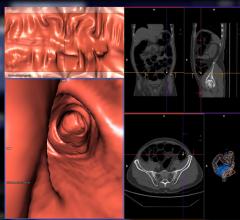September 18, 2008 - CT colonographic screening identified 90 percent of subjects with adenomas or cancers measuring 10 mm or more in diameter, in a study of asymptomatic adults entitled “Accuracy of CT Colonography for Detection of Large Adenomas and Cancers,” led by C. Daniel Johnson, M.D., of the Mayo Clinic.
These findings augment published data on the role of CT colonography in screening patients with an average risk of colorectal cancer. (ClinicalTrials.gov number, NCT00084929 [ClinicalTrials.gov] ; American College of Radiology Imaging Network [ACRIN] number, 6664.)
The study states that computed tomographic (CT) colonography is a noninvasive option in screening for colorectal cancer. However, its accuracy as a screening tool in asymptomatic adults has not been well defined.
Researchers recruited 2600 asymptomatic study participants, 50 years of age or older, at 15 study centers. CT colonographic images were acquired with the use of standard bowel preparation, stool and fluid tagging, mechanical insufflation, and multidetector-row CT scanners (with 16 or more rows). Radiologists trained in CT colonography reported all lesions measuring 5 mm or more in diameter. Optical colonoscopy and histologic review were performed according to established clinical protocols at each center and served as the reference standard. The primary end point was detection by CT colonography of histologically confirmed large adenomas and adenocarcinomas (10 mm in diameter or larger) that had been detected by colonoscopy; detection of smaller colorectal lesions (6 to 9 mm in diameter) was also evaluated.
The result provided complete data for 2531 participants (97%). For large adenomas and cancers, the mean (±SE) per-patient estimates of the sensitivity, specificity, positive and negative predictive values, and area under the receiver-operating-characteristic curve for CT colonography were 0.90±0.03, 0.86±0.02, 0.23±0.02, 0.99±
For more information: www.mayoclinic.com


 February 06, 2024
February 06, 2024 








